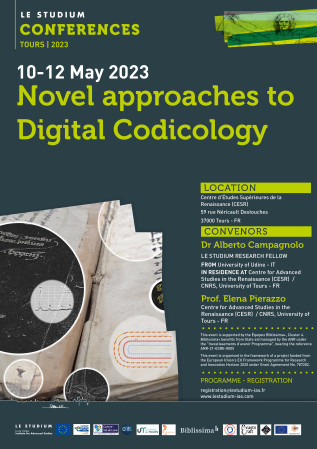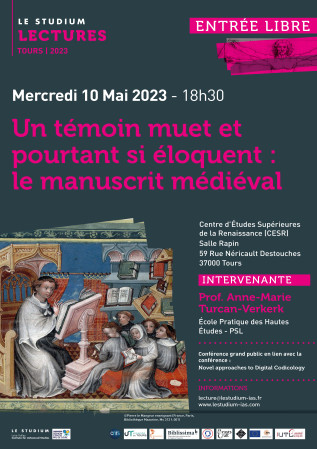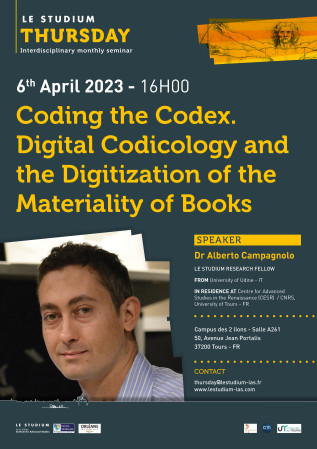Alberto Campagnolo

LE STUDIUM Research Fellow
From
In residence at
Centre for Advanced Studies in the Renaissance (CESR) / CNRS, University of Tours - FR
Host scientist
Elena Pierazzo
Biography
Alberto Campagnolo (orcid.org/0000-0002-8672-8400) trained as a book conservator (1998-2001) in Spoleto, Italy and has worked in that capacity in various institutions, among which the London Metropolitan Archives, and the Vatican Library. He studied Conservation of Library and Archive Materials (2001-2006) at Ca’ Foscari University Venice and then read for an MA in Digital Culture and Technology (2007-2009) at King’s College London. He pursued a PhD (2010-2015) on an automated visualization of historical bookbinding structures at the Ligatus Research Centre (University of the Arts, London). He was a CLIR Postdoctoral Fellow in Data Curation for Medieval Studies (2016-2018) at the Library of Congress (Washington, DC). He was an adjunct professor of Digital Humanities at the University of Udine, Italy (2018-2021).
Alberto has been collaborating (2013-ongoing) with Dot Porter (Schoenberg Institute for Manuscript Studies, University of Pennsylvania) on VisColl, a modelling and visualization tool for the gathering structure of books in codex format. He is the Editor-in-Chief of the Journal of Paper Conservation, and a member of the Executive Board of IADA (International Association of Book and Paper Conservators). Campagnolo, Alberto, ed. 2020. Book Conservation and Digitization. The Challenges of Dialogue and Collaboration. Collection Development, Cultural Heritage, and Digital Humanities. Leeds: Arc Humanities Press. https://www.aup.nl/book/9781641890533/book-conservation-and-digitization, E-book: <https://www.jstor.org/stable/j.ctv13gvhxx>
PROJECT
From Features to Data Points & Pixels: Investigations into the Transmediation of the Artefactual Nature of Books in the Digital
As three-dimensional movable objects provided with surfaces on which to store and deliver information, books are the product of the convergence and meeting of a series of technologies and preserve, in their inner working, the added value of technological and material data. Books need more than visual statements to be investigated, and the study of the book as an object relies on autoptic investigations into materiality features. To a certain degree, some information on the materiality of books can be inferred from catalogues, but, for the most part, one needs to investigate the objects directly, objects that may be dispersed across various institutions and countries. Traditional digitization transmediates only limited information regarding an object’s materiality. Aside from metadata assignation, advanced imaging techniques, such as RTI and photogrammetry, can acquire, and bring into the digital, material features linked to topography and stratigraphy. Photogrammetry also reconstructs the three-dimensional development of the object in a three-dimensional virtual space. Advanced imaging techniques have been applied to books, but mostly to help recover textual elements, study illumination characteristics and bookbinding tooling instead of studying material features.
The project, in collaboration with key research centres of the University of Tours, will have two main aims: the innovative and experimental application of RTI and photogrammetry to study the archaeology of the book (also in its three-dimensionality), and the publication of a monograph focused on the practical and epistemological questions related to the transmediation of the book as an object into the digital, and the implications of digital codicology for the study of written heritage through digital means.
Publications
Final reports
This paper explores the significance of photogrammetry as an accessible and innovative imaging technique for preserving and studying written cultural heritage. Focusing on the challenges of traditional digitization methods in capturing the materiality and craftsmanship of manuscripts and books, we present a cost-effective photogrammetry workflow using the 3DF Zephyr software. Demonstrating its potential, we discuss the generation of detailed 3D models and the integration with other software tools. The research findings were presented at the 19th International Seminar on the Care and Conservation of Manuscripts, and the paper is planned for publication in the conference proceedings. This work contributes to the broader discourse on Digital Codicology and encourages interdisciplinary collaboration in cultural heritage studies.



